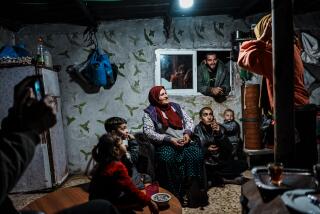Americans Alerted on Egypt Risk After Attack
- Share via
Middle East
Egypt: A tour bus parked in front of one of Cairo’s most popular tourist sites was set ablaze by attackers armed with guns and firebombs. Nine German tourists and their Egyptian driver were killed in the Sept. 19 incident, and several others were wounded. The attack occurred outside the Egyptian Museum, which houses extensive Pharaonic collections, including the treasures of King Tutankhamen. There was no immediate claim of responsibility, but police suspected Muslim militants, who have occasionally targeted foreigners. Within hours of the attack, the U.S. State Department cautioned Americans to be careful while in Egypt. The attack was the worst against foreigners since April 1996, when 34 Greek tourists were gunned down, 18 fatally, outside a hotel near the Pyramids.
Latin America
Cuba: Bombers apparently bent on disrupting tourism have struck at several well-known tourist sites in Havana during the past three months. Explosions, most of them small, hit at least six hotels and one restaurant. In the worst incident, an explosion in a bar of the Copacabana Hotel on Sept. 4 killed an Italian. Fidel Castro’s government has accused U.S.-based Cuban exile groups of the bombings.
Tourism has surpassed sugar as the island nation’s largest source of foreign revenue. Cuba says it expects more than 1 million visitors this year. The United States has no diplomatic relations with Cuba but stops short of forbidding travel there. Instead, it bars Americans from spending money in Cuba. Many, however, go there surreptitiously and spend anyway.
Briefly . . .
Israel: A month after 15 people died by synchronized terrorist bombs in Jerusalem, a new attack on Sept. 4 killed eight people and three suicide bombers in the heart of Jerusalem. The State Department again warned Americans in the capital to avoid crowded pedestrian and shopping areas, as well as public buses and bus stops. . . . Peru: Authorities reopened the Inca citadel of Machu Picchu, one of Latin America’s most famous archeological sites, after quelling a fire that burned nearby for five days, scorching 2,000 acres of Andean mountain forest. . . . Russia: Flying aboard Russia’s hundreds of small airlines appears more dangerous these days, with 66 people killed in seven air crashes during the first half of this year, a senior Russian aviation official reported. The totals are higher than those for all of 1995 and 1996. Human error has been blamed for 79% of all the crashes. . . . Yemen: A 49-year-old Italian man was the latest in a parade of foreign travelers to be kidnapped by tribes men and then released after a few days. The mountain tribes’ hostages, held as pawns in land disputes with the government, have included U.S. and French diplomats, a Saudi ambassador and various European tourists. So far, all have been released unharmed. . . . India: Police have stepped up downtown patrols after learning of the possibility of an attack by Kashmiri terrorists in New Delhi. There is no indication that Americans are targeted, but the U.S. Embassy advises Americans in the capital to be alert for the next few weeks. . . . Tanzania: Conditions are unsettled in western and northwestern Tanzania, and troops have increased on both sides of the border with Burundi. Americans without specific business in the region are advised to avoid those areas.
Hot spots: Travel warnings are posted for Afghanistan, Albania, Algeria, Angola, Bosnia-Herzegovina, Burundi, Cambodia, Central African Republic, Colombia, Congo (formerly Zaire), Iran, Iraq, Lebanon, Liberia, Libya, Montserrat, Nigeria, Republic of Congo, Rwanda, Sierra Leone, Somalia and Sudan.
The U.S. State Department offers recorded travel warnings and advisories at (202) 647-5225; the fax line is (202) 647-3000. Internet address: https://travel.state.gov.
More to Read
Sign up for Essential California
The most important California stories and recommendations in your inbox every morning.
You may occasionally receive promotional content from the Los Angeles Times.










